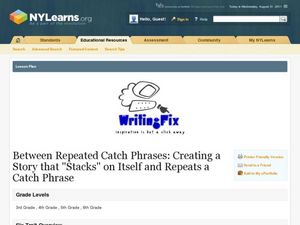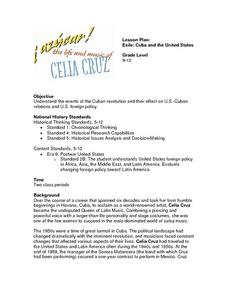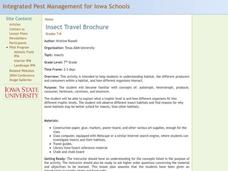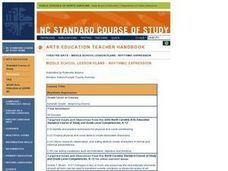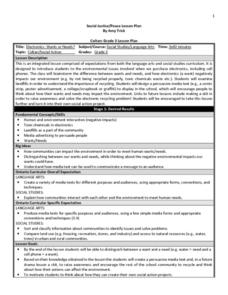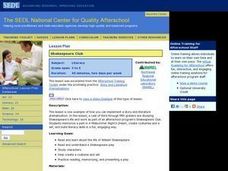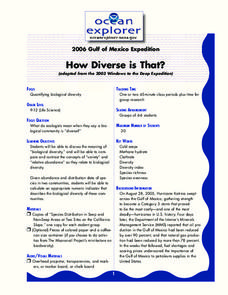Curated OER
Creating a Story that "Stacks" on Itself and Repeats a Catch Phrase
Students explore language arts by reading a classic children's story in class. In this story structure lesson, students read the Judith Viorst book, Alexander and the Terrible, Horrible, No Good, Very Bad Day. Students discuss the...
Curated OER
Pumpkins!
Young scholars discuss emotion, draw pumpkin faces and write about the way their pumpkin is feeling. In this emotions lesson, students make pumpkin faces and match pumpkin seeds to a card with seeds.
Curated OER
Exile: Cuba and the United States
High schoolers gain an understanding of U.S./Cuban Relations. In this world history lesson plan, students examine the events of the Cuban revolution and their effect on U.S.-Cuban relations and U.S. foreign policy.
Curated OER
Building a Butterfly Garden
Students examine the habitat and life cycle of a butterfly. In this early childhood lesson plan, students identify the parts of a butterfly, as well as the stages of the butterfly life cycle. Students also plant a garden in which they...
Curated OER
To Drink or Not to Drink?
Second graders compare water conservation issues as they impact the past, present, and future in Nevada. In this water conservation lesson, 2nd graders perform and ice experiment to comprehend water collection differences. Students...
Curated OER
Insect Travel Brochure
Students explore the concept of insects and their habitats. In this insect habitat lesson, students create travel brochures for particular insects. Students must include habitat, producers, and consumers with in the vacation...
Curated OER
Dear Presidential Diary
Young scholars discover how a president spends the day. In this presidential history lesson, students research primary sources in order to write their own diaries for presidents that include suggestions of laws, managing personnel,...
Curated OER
Federalism
Students become familiar with the Federalist papers and the work of the federal government. In this federalism lesson, students find similarities and differences between state and federal government.
Curated OER
Brain Awareness Week
Students explore human anatomy by completing a list of activities over five days. In this brain science lessons, students examine images of brains and identify the different parts. Students complete an in-class quiz regarding brain...
Curated OER
Surviving the Conditions
Students explore Earth science by participating in an environmental care activity. In this natural resources lesson, students discuss ways to protect themselves from the environment if they are ever in need of shelter in the wilderness....
Curated OER
Attributes of Renewable Energy: From Nanopossibilities to Solar Power
Students explore solar energy, why we use it and how we use it. In this renewable energy lesson students compare active and solar techniques.
Curated OER
Rhythmic Expression
Students discover movement and expression to music/sound through a series of teacher-led exercises and role plays. This lesson is ideal for the middle school drama class with possibilities for adaptation to any level of drama or general...
Curated OER
Electronics: Wants or Needs?
Third graders determine how electronics negatively impact the environment. In this environmental lesson, 3rd graders read the article "Earth Friendly Waste Management", and identify how recycling impacts our environment. Students...
Curated OER
Savings Accounts and Interest
First graders study money, banks, and getting interest on money. For this consumer math lesson, 1st graders listen to Stan and Jan Berenstain's, Berenstain Bears' Trouble With Money. They use the concepts in the book to discuss...
Curated OER
The Beat of the Blues
This lesson focuses on how students can learn basic blues percussion patterns by considering the polyrhythms of African drumming and investigating how and why such drums were banned during slavery. Students will listen to several blues...
Curated OER
Comparing Chimp mtDNA to Learn about Races
In this computer-based lesson, students will measure genetic diversity within and between three subspecies of chimpanzees in order to gain a better understanding of genetic distinctiveness and explore race as a genetic concept.
Curated OER
Pieces of Me
Eighth graders explore themselves and their community. In this writing lesson, 8th graders brainstorm ideas about their childhood, middle years, family, and future goals. Students write an autobiographical sketch about...
Curated OER
Shakespeare Club
Students explore literature dramatization. In this Shakespeare lesson, students discuss the characters from the play A Midsummer Night's Dream and construct costumes and a set.
Curated OER
Ben Franklin the Good Citizen
Students investigate Benjamin Franklin's contributions to society. In this history lesson, students read about Franklin's philanthropic behavior and play a bucket brigade game to re-enact how fires were put out during colonial times.
Curated OER
Making Good Money Choices
Students determine how to spend donated money. In this money choices lesson, students explore the needs of the community. They determine the best use of donated funds for a good cause or charity. Students play a bingo game to reinforce...
Curated OER
Interviewing Skills
Students participate in mock interviews. In this interview skills instructional activity, students prepare for a mock interview by following the provided instructional activity procedures, participate in the evaluated interview, and...
Curated OER
How to Graph in Excel
Fourth graders construct data graphs on the Microsoft Excel program. In this statistics lesson, 4th graders formulate questions and collect data. Students represent their results by using Excel.
Curated OER
Guetemala's Changing Forest
Eighth graders compare their local ecological zone to the tropical rainforest. In this natural ecology instructional activity, 8th graders complete an activity about the differences in ecological zones. They compare their biome to the...
Curated OER
How Diverse is That?
Young scholars discuss biological diversity in ocean communities. In this diversity lesson, students examine the variety of organisms compared to relative abundance. They will write an analysis and discuss their findings with the class.


